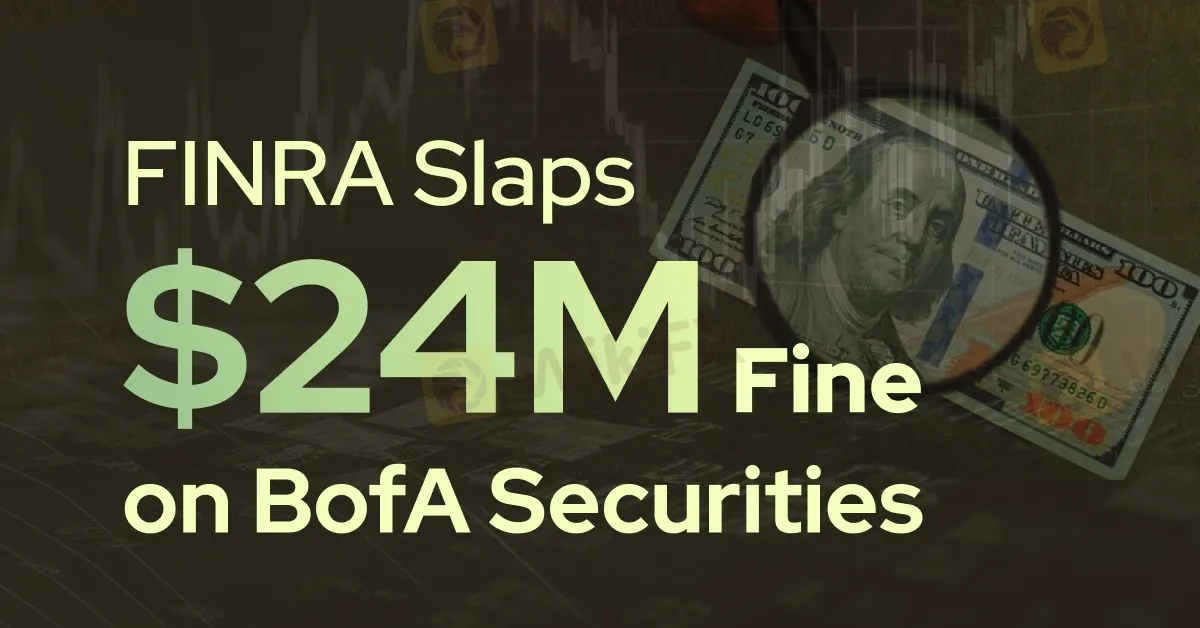简体中文
繁體中文
English
Pусский
日本語
ภาษาไทย
Tiếng Việt
Bahasa Indonesia
Español
हिन्दी
Filippiiniläinen
Français
Deutsch
Português
Türkçe
한국어
العربية
FINRA Slaps $24M Fine on BofA Securities
Abstract:FINRA levies $24 million fine against BofA Securities for alleged spoofing and supervisory failures, unveiling ongoing regulatory scrutiny across financial markets.

The Financial Industry Regulatory Authority (FINRA) has taken action against BofA Securities, imposing a significant fine of $24 million. This penalty comes as a result of the firm's alleged involvement in more than 700 instances of spoofing and associated supervisory shortcomings within the US Treasury secondary markets, spanning over a six-year period.
Spoofing, a practice involving deceptive orders to fabricate market activity, was reportedly employed by BofA Securities through two former traders in the US Treasury secondary markets from October 2014 to February 2021. The firm stands accused of engaging in 717 instances of spoofing during this time.
The Executive Vice President and Head of Enforcement at FINRA, Bill St. Louis, expressed concern, highlighting that spoofing undermines market transparency and integrity by distorting actual supply and demand. He emphasized that this action underscores FINRA's commitment to vigorously pursue firms involved in spoofing, including cross-product spoofing.
Throughout this duration, BofA Securities failed to establish and sustain a supervisory system capable of detecting spoofing activities in the US Treasury markets. Although a system was implemented by the company in November 2015, it remained inadequate until mid-2019, primarily detecting algorithmic spoofing and not manual manipulation by traders.

While BofA Securities has accepted FINRA's findings without admitting or denying the charges, it's worth noting that the company was previously fined $325,000 last year by FINRA for allegedly issuing inaccurate monthly reports for order execution.
The regulatory body disclosed that between January 2014 and February 2022, BofA Securities incorrectly reported order execution statistics for its two market centres, MLCO and MLIX. The company reportedly disregarded the requirement to present separate statistical information under Rule 605, leading to combined reports for both centres being published.
In a separate incident, Credit Suisse faced scrutiny when FINRA fined its US subsidiary $900,000 for deficiencies in regulatory reporting. The violations involved tardy trades and inaccurate reports from November 2015 to March 2023 on the Trade Reporting and Compliance Engine.
Earlier this year, Webull was subject to a $3 million penalty by FINRA. The focus was on the firm's oversight in onboarding options traders and the absence of adequate supervisory systems to identify and address customer complaints. This oversight led to the approval of roughly 9,000 unqualified traders, including more than 2,500 customers under 21 without the required options trading experience.

Disclaimer:
The views in this article only represent the author's personal views, and do not constitute investment advice on this platform. This platform does not guarantee the accuracy, completeness and timeliness of the information in the article, and will not be liable for any loss caused by the use of or reliance on the information in the article.
Read more

Forex Hedging: Is It a Trader’s Safety Net or Just an Illusion?
In the volatile world of forex trading, risk is inevitable. One widely used strategy is forex hedging, which is a useful technique designed not to eliminate risk entirely, but to reduce its potential impact. As global economic uncertainty persists, understanding how hedging works could be an essential addition to a trader’s toolkit.

Thinking of Investing? Read Must-Know Facts About Funding pips!
When you check the internet for Funding Pips, you'd be surprised to know it's filled with praise for Funding Pips but often lacks the real facts that traders need. Everything that seems too good to be true should always be verified first. It could be Fraud . So, we conducted research and collected several facts you must know about Funding Pips.

OctaFX Back in News: ED Attaches Assets Worth INR 134 Cr in Forex Scam Case
The Enforcement Directorate (ED) in Mumbai has attached assets worth around INR 131.45 crore. This included a luxury yacht and residential properties in Spain. Read this interesting story.

Truth About Angel One – Here’s What You Need to Know
Thinking about investing in Angel One? Wait! Know the essential things about the broker before Invest. It could be SCAM. Read, think, and invest .
WikiFX Broker
Latest News
Global Brokers Vs. Indian Rules: Why They Struggle in India
Services Surveys Signal 'Expansion' In June, Inflation Fears Remain High
ASIC cancels AFS licences of Ipraxis and Downunder Insurance Services
CFD Brokers Face Dual Compliance Pressures Ahead of 2026: Australia and EU Tighten Rules
FxPro to Launch Crypto Trading Desk, Deepening Digital Asset Push
CFI Financial Group Becomes Official Online Trading Partner of Etihad Arena
Discover 5 Benefits of Trading with Trive FX Broker
Major Risks Associated with AuxiliumFX: You Need to Know
IPO market gets boost from Circle's 500% surge, sparking optimism that drought may be ending
Asia-Pacific markets trade mixed ahead of Trump's deadline for higher tariffs
Currency Calculator


